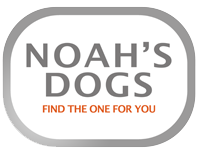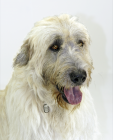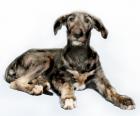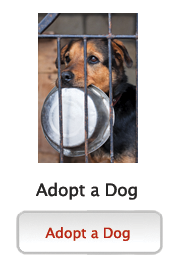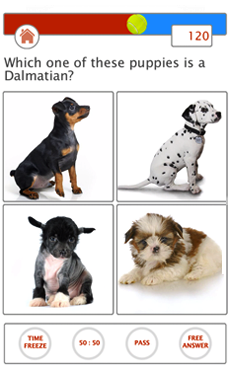Irish Wolfhound
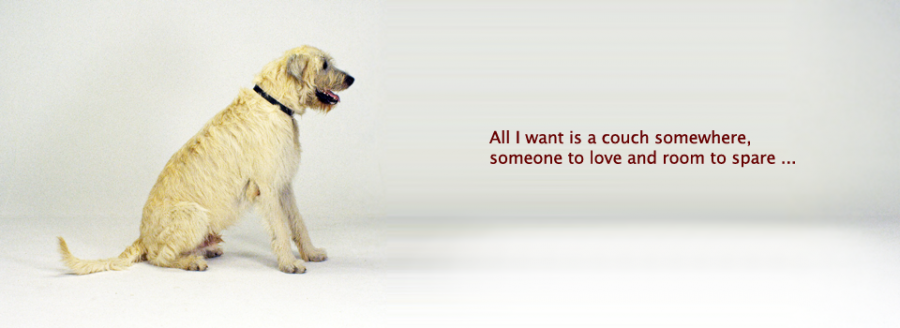
In my own words
Top o’ the morning to you! Like all the Irish, I’m a charming sort of a feller, though I says it meself. Don’t let my speedy looking frame mislead you, ‘cos apart from a nice run and a game, me favourite place is your cosy couch and a knee I can rest me head on. I’m a real family dog you know, though I know I have to watch meself around the very little people, as I might knock one over. Older children are fine though and I do love a good game. All that wolf hunting is done with now (there aren’t any left!) and all my instincts are towards having a good time and then lying meself down in front of the fire, with your kind permission of course – I always mind me manners I do.
My ideal owner(s)
Outdoorsy people
Active, sporty types
Families with older children
Experienced handlers
What they say about me
Gentle giant
Laid back
Intelligent
Eager to please
Polite
Ever young
Is this Irish Wolfhound for you?
Test your knowledge about the Irish Wolfhound
Information essential about the Irish Wolfhound
Kennel Club Group:
Hound
Size: Large: Male Height 31” (79cm) to shoulder, Female 28” (71cm). Weight: Male 120 lb (54 kg) Female 90 lb (40.9 kg).
Popularity:
Very popular among aficionados of the breed, but because he is not well suited to city life, being so big and independent minded, the Irish Wolfhound is essentially a country dog.
Breed History:
The Irish Wolfhound was originally either smooth or rough coated, though the smooth coated type died out sometime during the early 19th Century. The breed was used from ancient times for hunting wolves and the Great Elk which was once common in Ireland. They were highly prized by English noblemen who adopted them as hunting dogs themselves. Irish Wolfhounds were also used as War Hounds, and when the Roman invaders came they were terrified by them. Not that this didn’t stop them taking some back to Rome to use in the Games. Thanks to their efficient coursing methods, wolves and elks eventually became extinct and the Irish Wolfhound also died out too, thanks to the lack of prey and the Great Famine of 1840. However, by 1870 the breed was re-established and a breed club was in existence by 1885.
Character:
One of the gentlest of dogs, your Irish Wolfhound is nothing like the ferocious War Hound of history. He never appears in a hurry to do anything, but he can cover a lot of ground with that great loping stride, and needs a good two hours of exercise every day. He has a naturally proud, calm bearing, and does not bark much at all. Devoted to his family, he will be stand-offish with total strangers, but never aggressive. However, his close affinity with humans makes your Irish Wolfhound acutely sensitive to ill will or malicious intent which makes him a wonderful guardian, though not the best of guard dogs (remember he doesn’t bark). He is the perfect dog to have around if you live alone. Your Wolfhound is born with specialised skills, so while not aggressive or territorial with other dogs, he will ‘course’ them at play (chase and bring down). This is hunting behaviour, and not fighting or dominating behaviour. Most Wolfhounds are gentle with children, and aware of their power and size, though they can knock toddlers and elderly people down if there isn’t enough space. With his warlike history centuries behind him, your Irish Wolfhound will give you and yours lifelong loyalty, patience and devotion.
Temperament:
Your Wolfhound would rather spend most of his time lazing on a nice big sofa (preferably on top of you – he thinks he’s a lapdog), or stretched out in front the fire, keeping all the heat off you. However, he needs a lot of exercise or he will become bored and moody. Equally, if you leave him alone too much, he will become depressed and morose. Company is what he needs, and what makes him tick. Centuries of bonding with his master and acting as food provider and protector have made him particularly devoted. Your Wolfhound is always young at heart, and loves to play and run with anyone who will join in a game. A healthy Wolfhound will remain playful all his life.
Conformation:
Your Irish Wolfhound should give the impression of great size, strength and symmetry. He should look proud and commanding, muscular and graceful. The long head should be carried high, the eyes oval and dark brown. The velvety rose bud ears should be relatively small. The muzzle should be long and slightly tapering to a strong jaw. The long neck should be strong and well arched, with firm skin underneath. The front legs should be straight and have well tucked under elbows, not turned in or out. The chest should be deep with a wide breast, long back with arched loins with the belly well drawn up. The hindquarters should be strong, with muscular thighs, and well let down hocks which look straight from behind. All four feet should point forwards. The coat should be rough and harsh on the body, legs and head, with long wiry eyebrows and a slight beard.
Colour:
Wolfhounds can be grey, steel grey, black, brindle, fawn, wheaten, red or pure white.
Training:
Your Wolfhound is very intelligent and is easy to train. He won’t respond to harsh treatment or shouting, because he was born eager to please you, so make it positive and reward based. Don’t forget that historically your Wolfhound was required to work at great distances from his master, and make a lot of his own decisions, so you may find he anticipates what you want, rather than waiting for your command. If he gets it wrong, don’t tell him off, he was only trying to do the right thing.
Care:
Your Wolfhound’s coat is fairly self maintaining, so a good brush every couple of weeks should suffice, with a visit to the beautician twice a year to keep him looking drop dead gorgeous.
Health:
Irish Wolfhounds are not long lived due to their enormous size, but a healthy individual should reach 8 to 10 years without too many problems. The leading cause of death tends to be bone cancer, followed by heart disease. Liver problems also occur. Your Wolfhound, due to his deep girth, is prone to bloat (gastric torsion) which is very serious if not given veterinary attention immediately, but this can largely be prevented by feeding several small meals a day rather than one or two big ones, and taking care not to exercise too soon after meals. It is recommended by breeders that your Wolfhound should be fed a low protein adult dog food from puppyhood, with no supplements. Take care to buy only from a reputable breeder, and with proper care, your Wolfhound will give you many years of loyal devotion and keep you fit into the bargain.
You may also like:
If you like Irish Wolfhounds, you may be interested in breeds of the same size »
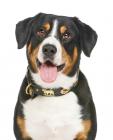
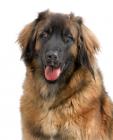
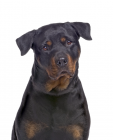
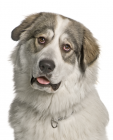
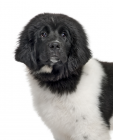
If you like Irish Wolfhounds, you may like other breeds with similar characteristics »

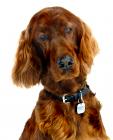
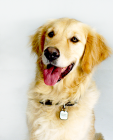
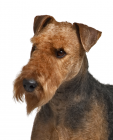

If you like Irish Wolfhounds, you may be interested in these other hound dogs »
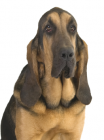
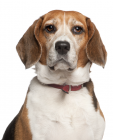
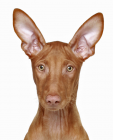
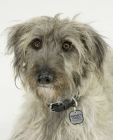
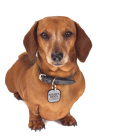
Advice on choosing your breed »
Find an animal shelter or rescue home where a Irish Wolfhound is waiting for a new home »
The following grid gives a fast track review which covers all breeds. You can apply it to help you decide if a Wolfhound is suitable for you, the environment where you live, your personality and your lifestyle. On the grid, 1= strongly disagree, and 5= strongly agree. For example, if you are looking for a dog that makes a good walking companion, look down the list under Activities, and you will see that Wolfhounds make great walking companions, scoring 5. If you want a dog that is good with children, look under Role & Suitability, and you will see that Wolfhounds are good with older children, and score 4. You might like to save or print off this section and keep it for reference while you check some other breeds before making your final choice.
Be the first to rate this breed »
|
*PLEASE NOTE: All our breed profiles are general, and all dogs are individuals. Always talk to the breeders and meet the owners you are buying from. Try to meet the dog and its parents if it is a puppy in their home environment.
